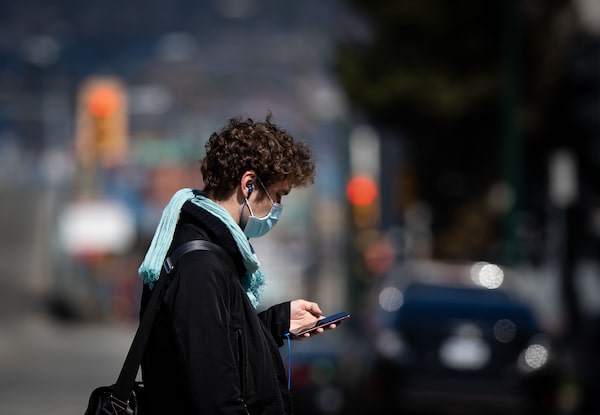
A man wearing a protective face mask looks at his phone while walking in the Downtown Eastside of Vancouver, on April 10, 2020.DARRYL DYCK/The Canadian Press
The heavy psychological toll of life under lockdown is becoming clearer as new data from Canadian police agencies and the Ontario Medical Association show a surge in mental-health needs that threatens to linger for years.
Statistics Canada figures gathered from 19 police forces serving 70 per cent of the Canadian population show that police-reported crime was down by 18 per cent during the first eight months of the pandemic, but calls for service to police increased 8 per cent.
Much of that greater workload was driven by a rush of calls related to mental health. Compared with the same period from the previous year, police fielded 13 per cent more calls for general well-being checks and 12 per cent more requests to respond to people in emotional crisis or apprehensions under the Mental Health Act.
Many pandemic-weary employees showing signs of burnout, mental health providers warn
How can police best serve and protect on mental-health crisis calls?
That trend held in Canada’s biggest city, where Toronto police recorded a 12-per-cent increase in mental-health calls, said Inspector Chris Boddy, who has worked on mental-health initiatives within the force for more than a decade. “It’s often said that police have been put in the position to be the de facto mental-health system,” he said. “That’s not what anybody wants. People may be having difficulty finding other services available right now.”
The need is reflected in visits to doctors as well. In an analysis of Ontario health data, the OMA found that mental-health visits to physicians didn’t rise during the first four months of the pandemic. But in the latter half of the year, from August to December of 2020, major mental-health visits jumped by 8 per cent and all other mental-health visits rose by 12 per cent.
“We’re talking about levels of despair that are truly astronomical,” psychiatrist Renata Villela said during an OMA media briefing this week in which doctors warned that psychological issues related to COVID-19 will last for years to come.
In a press release, the association representing Ontario’s 43,000 physicians, medical students and retired doctors noted that mental-health issues linked to the 1918 influenza pandemic continued for at least six years after that virus had largely subsided.
“History tells us that the demand for mental-health services will continue to grow in the years to come and that demand will contribute to the pandemic deficit of care we have yet to address,” OMA president Samantha Hill said.
Call volume last year at Toronto’s Gerstein Crisis Centre – a 24-hour intervention service that has a crisis hotline, care beds and mobile health teams – soared a whopping 70 per cent over the previous year, with people reporting isolation and increased mental-health symptoms.
In Hamilton, calls to the Crisis Outreach and Support Team crisis line have increased 10 per cent to 15 per cent in the past year, according to Holly Raymond, clinical director of general psychiatry and addiction services for St. Joseph’s Healthcare Hamilton.
COAST is a partnership between mental-health workers at St. Joseph’s and Hamilton police officers, and is available 24 hours a day to people experiencing a mental-health crisis.
Ms. Raymond said the majority of people calling COAST are connected with other social services, but are experiencing a situational crisis – whether that’s loneliness or feeling overwhelmed.
“People are isolated and a lot of the usual outlets that people have, and the ways that people cope socially, they don’t have anymore,” she said. “And we’ve been coping this way now since March, with some breaks and some changes, and people are just at their wits’ end.”
She said people are juggling stressors such as financial challenges, relationships or even having children home and juggling online learning.
“When people see an end to their stress, they generally cope better. It’s stress that you don’t see an end to that actually has a much greater impact on you.”
Teens, too, are feeling the pressure.
“I for sure think that mental-health challenges have increased, especially in the second wave [of the pandemic], students are more stressed this time around,” said Cathy Lihou-Perry, president of the Ontario School Counsellors’ Association and a guidance counsellor at Pauline Johnson Collegiate and Vocational School in Brantford, Ont.
One of the main stresses on children, she said, is that they’ve been cut off from their friends and social circles.
With no end in sight, she said guidance counsellors are shifting their focus to offer resources and information on family wellness versus individual students.
“We’re doing what we can with kids,” Ms. Lihou-Perry said, “but it’s about reaching parents, too, and offering support to them, because often that’s what’s trickling down, right.”
Our Morning Update and Evening Update newsletters are written by Globe editors, giving you a concise summary of the day’s most important headlines. Sign up today.